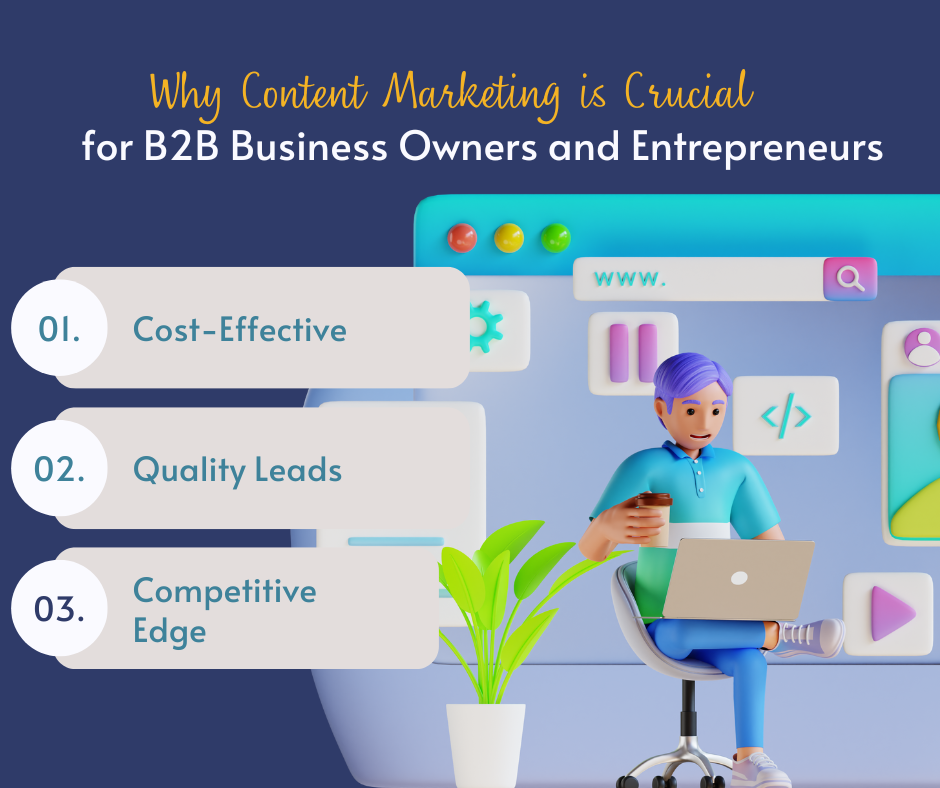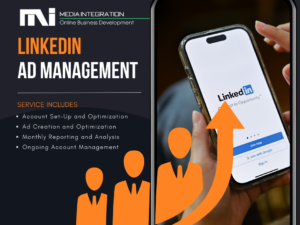The Shift Towards Content Marketing in B2B and Why You Can’t Ignore It
In a digitally-connected world, the importance of content marketing for B2B cannot be overstated. If you’re a business owner or an entrepreneur, it’s likely that you’ve come across the term ‘content marketing.’ You may even have dismissed it as yet another buzzword in the sea of marketing jargon. However, dismissing content marketing would be a grave mistake. It’s not just another term to be bandied about; it’s a strategic approach that focuses on creating and sharing valuable, consistent content to attract and retain a clearly defined audience. Ultimately, it aims to drive profitable customer action, including increased sales, customer retention, and brand loyalty.
Now, why is this shift towards content marketing in B2B so important? In today’s competitive landscape, traditional marketing methods are rapidly losing their effectiveness. Tactics like cold calling, direct mailers, and other outbound strategies have limited impact. These older methods are increasingly seen as intrusive, and they rarely build meaningful relationships with potential clients. According to Forrester, buyers could be anywhere from two-thirds to 90% of the way through their buying journey before they even reach out to the vendor1. This means that your potential customers are doing their own research long before they contact you.
The modern buyer is informed, discerning, and seeks value at every turn. Content marketing serves to fulfill this need for value by offering insightful, useful content that solves real problems for your audience. It’s not just about pitching your products or services; it’s about establishing you as a thought leader in your industry, someone who can be trusted. Trust, as you may know, is invaluable in any B2B relationship. Moreover, high-quality content has the ability to generate high-quality leads, making your marketing efforts more efficient and effective.
If you haven’t yet understood why content marketing is important for B2B, then you’re missing out on a powerful strategy that can bring value to both your business and your customers. From building brand authority to driving ROI, content marketing is the tool that many successful B2B businesses have adopted for sustainable growth.
Why Traditional Marketing Falls Short in Today’s B2B Landscape
Cold calls and unsolicited emails are rapidly losing their charm and effectiveness. In fact, HubSpot reports that generating traffic and leads presents the biggest challenge for 65% of businesses[^1^]. Let’s delve into why traditional marketing tactics are losing ground, especially in the B2B sector.
First, consider the cost factor. Traditional marketing methods like advertising in trade journals, attending industry events, and direct mailing can cost a small fortune. Even then, these tactics often generate leads that are not only costly but also low in quality. In contrast, content marketing is more cost-effective and provides a better ROI, which we’ll discuss in the next section.
Additionally, the modern buyer is far more educated and informed than before. Thanks to the internet, most B2B buyers perform extensive online research before making a purchase decision.
Navigating the customer’s purchasing journey can be complex. In the context of intricate B2B solutions, a typical buying group usually consists of six to ten decision-makers. Each of these individuals often comes to the table with four or five unique pieces of information they’ve independently gathered, which then have to be reconciled within the group1.
This means disruptive advertisements, the core of traditional marketing, are less effective. Today’s buyers find them intrusive and prefer seeking out information that adds value to their lives or businesses.
The paradigm has clearly shifted. The educated buyer seeks trustworthy information and genuine solutions to their problems, rather than a sales pitch. And because of this change in buyer behavior, B2B businesses need to evolve their marketing approach to meet these needs. The era of relying solely on traditional marketing is over. It’s time to explore what modern marketing methods can do for you, especially focusing on why content marketing is important for B2B.
The Impressive ROI of Content Marketing in B2B
If you’re still questioning why content marketing is important for B2B, the answer lies in its substantial return on investment (ROI). Content Marketing Institute has provided compelling data that should catch the eye of any business owner or entrepreneur. Based on research, content marketing not only costs 62% less than conventional marketing methods but also triples the number of leads generated, making it a highly cost-effective strategy for reaching your target audience2. This is a significant statistic that underscores the efficiency of content marketing strategies.
Another aspect that highlights the effectiveness of content marketing is its impact on lead generation, particularly for companies with a blog. Companies in the B2B sector that maintain a blog generate 67% more leads compared to those that don’t have one2. A blog serves as a platform where you can offer value by solving problems, answering questions, and providing insights related to your industry. This not only enhances your brand’s authority but also builds trust among potential clients.
The economic advantages are clear: content marketing saves you money. But it’s not just about cost-cutting; it’s about getting more for less. When you invest in content marketing, you’re effectively reaching a larger and more targeted audience at a fraction of the cost of traditional marketing methods. This leads to higher-quality leads, which in turn increases the chances of conversions.
Consider this—high-quality leads are more likely to become high-value customers, providing a long-term revenue stream for your business. So, the returns from content marketing don’t just stop at lead generation; they extend into long-term customer relationships, brand loyalty, and consistent revenue streams. These long-term benefits make content marketing a wise investment, shedding light on why content marketing is crucial for B2B business success.
In the next section, we’ll explore some real-world examples of B2B companies that have successfully implemented content marketing strategies to give you a better understanding of its practical impact.
Real-World Examples of B2B Content Marketing Success
Several companies have already reaped the benefits of B2B content marketing. American Express, for instance, has its ‘Open Forum,’ a collaborative website where professionals share advice and insights4. Through this platform, American Express has built a community and solidified its reputation as a thought leader. Another example is General Electric’s ‘GE Reports,’ a blog focusing on the intersection of technology and industry5. This strategy has not only increased brand awareness but also drives quality traffic to their products.
How to Successfully Implement Content Marketing in Your B2B Business
Now that you understand why content marketing is important for B2B, let’s move on to the actual implementation. The effectiveness of content marketing lies in its ability to address the needs of a specific audience. Here’s a step-by-step guide to implementing a content marketing strategy that delivers results.
Step 1: Identify Your Target Audience and Their Pain Points
Understanding your target audience is the cornerstone of any successful marketing strategy. Identify who they are, what industries they operate in, and most importantly, what challenges they face. Conduct surveys, interviews, or use analytics tools to collect this data. The clearer your understanding, the more targeted and effective your content will be.
Step 2: Create Valuable Content That Solves Problems
Once you know your audience’s pain points, it’s time to offer real solutions. Create content that directly addresses these issues. It’s not just about selling your product but offering actionable advice, insights, or solutions that can help them even if they don’t buy from you immediately. This builds trust and authority in your domain.
Step 3: Utilize a Variety of Content Formats
While blogs are an effective content format, don’t limit yourself. Utilize other forms like podcasts, videos, infographics, and webinars to deliver your message. A multi-format approach caters to different learning styles and reaches a broader audience.
Step 4: Promote Your Content
Creating content is just one part of the equation. You must promote it through the right channels for maximum impact. Leverage social media platforms, email newsletters, and most importantly, search engine optimization (SEO) to ensure that your content reaches your intended audience.
Step 5: Monitor and Analyze Performance
Lastly, the effectiveness of your content marketing strategy should be continually monitored and analyzed. Use tools like Google Analytics to measure key performance indicators such as traffic, engagement, and conversion rates. This data will help you refine your strategy, making it more effective over time.
By following these steps, you’re not just implementing a marketing tactic; you’re building a scalable, sustainable marketing engine that will provide long-term value to your business and your audience. So if you haven’t already started, now’s the time to fully invest in understanding why content marketing is crucial for B2B and make it an integral part of your marketing toolkit.
(Note: The above is a general guide; actual implementation can vary based on specific business needs and industry nuances.)
Conclusion: Why Content Marketing Is Essential for B2B Success
Content marketing is far more than just a passing trend; it’s an evolving domain that’s here to stay and offers tangible benefits for businesses in the B2B sector. In this article, we’ve dissected why traditional marketing methods are becoming obsolete, underscored the impressive ROI that content marketing offers, and laid out a step-by-step guide on implementing it in your business strategy.
To recap:
- Traditional marketing strategies like cold calling and unsolicited emails are losing efficacy, partially due to the educated and discerning modern buyer.
- Content marketing is not just cost-effective but also exceptionally efficient, generating three times the number of leads compared to traditional marketing.
- Implementation involves a multipronged approach that starts with understanding your target audience and creating valuable content. Following this, the use of multiple formats, effective promotion, and constant performance monitoring are crucial for success.
As a business owner or entrepreneur, the imperative is clear: understanding why content marketing is important for B2B isn’t optional—it’s essential. Your action plan should involve identifying your target audience, crafting valuable content, leveraging multiple channels for distribution, and continually monitoring and refining your strategy. Now is the time to act and make content marketing a cornerstone of your B2B marketing strategy.







